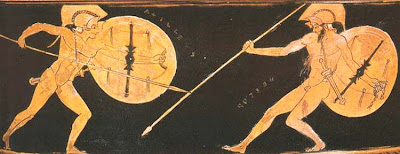A Noiseless Patient Spider
A noiseless patient spider,
I mark'd where on a little promontory it stood isolated,
Mark'd how to explore the vacant vast surrounding,
It launch'd forth filament, filament, filament, out of itself,
Ever unreeling them, ever tirelessly speeding them.
And you O my soul where you stand,
Surrounded, detached, in measureless oceans of space,
Ceaselessly musing, venturing, throwing, seeking the spheres to connect them,
Till the bridge you will need be form'd, till the ductile anchor hold,
Till the gossamer thread you fling catch somewhere, O my soul.
 I've loved this poem for a long time, since before I could articulate how much of myself I saw in it. (Loving the poem was my way of articulating certain secret parts of myself.) Standing isolated, launching forth filament after filament into the seemingly "vacant vast surrounding." That was my sense of the universe -- vacant. And yet having an inkling that in fact, it is not all so vacant. An ocean is not a void -- it is a rich, life-giving substance. Seeking the spheres, emminating out like layers of consciousness, and seeking to connect them, and to connect myself to them. Seeking to build a bridge, to be a bridge, to something yet unseen, only mused about, but with faith that the venture will prove worthy.
I've loved this poem for a long time, since before I could articulate how much of myself I saw in it. (Loving the poem was my way of articulating certain secret parts of myself.) Standing isolated, launching forth filament after filament into the seemingly "vacant vast surrounding." That was my sense of the universe -- vacant. And yet having an inkling that in fact, it is not all so vacant. An ocean is not a void -- it is a rich, life-giving substance. Seeking the spheres, emminating out like layers of consciousness, and seeking to connect them, and to connect myself to them. Seeking to build a bridge, to be a bridge, to something yet unseen, only mused about, but with faith that the venture will prove worthy.This poem expresses a kind of courage that often remains hidden within myself, like a seed that needs much tender watering before it dares to venture forth a tendril. This poem waters that seed.
I see this poem as a bridge toward Right View. We (or I) start out feeling isolated, detached, surrounded yet alone; but as we (I) unreel ourselves outward, we (I) start to experience that which is "outward" as "inward" as well. Not so separate after all. "Till that bridge you will need is form'd" -- I love that phrase. Bridge or boat: either way I'll meet you on the other side.
Hail Walt-Whitman-ishvara, Bodhisatva of Sphere Seekers!







